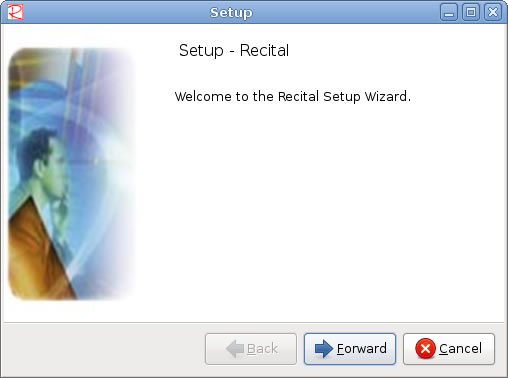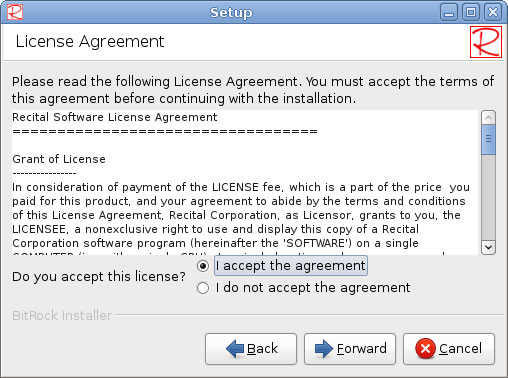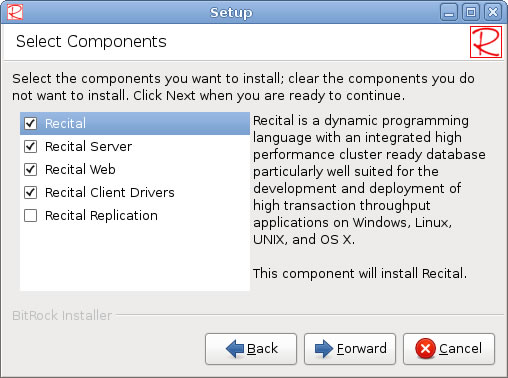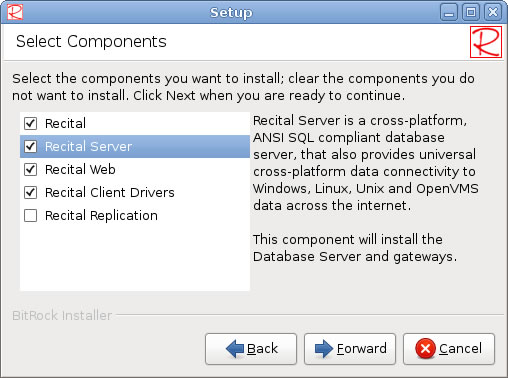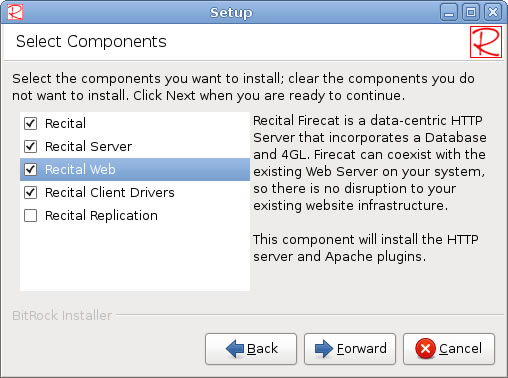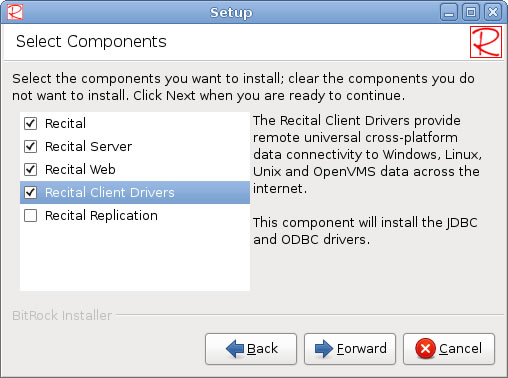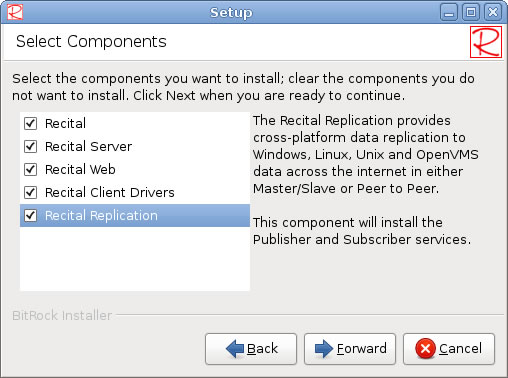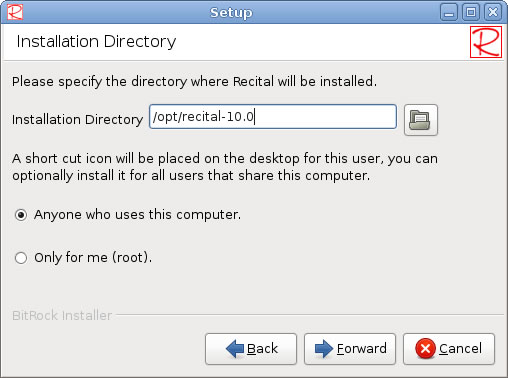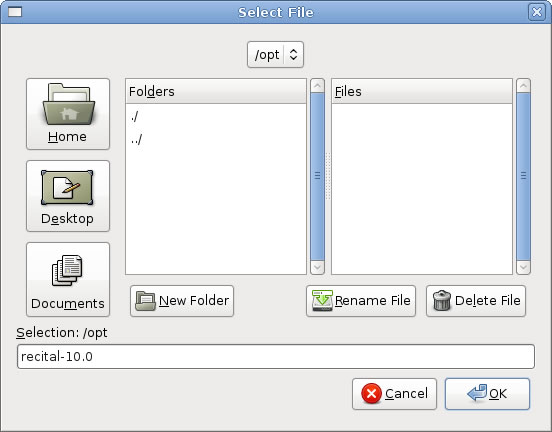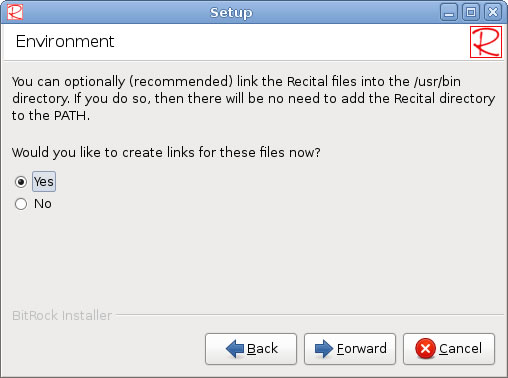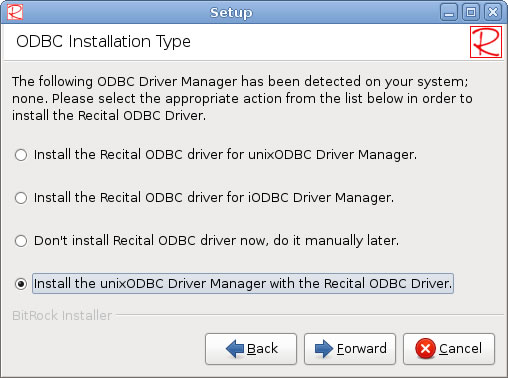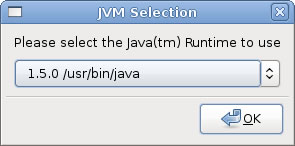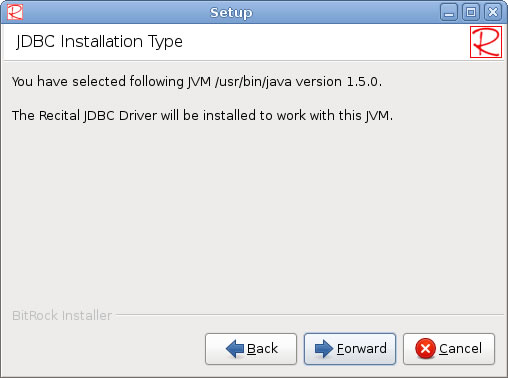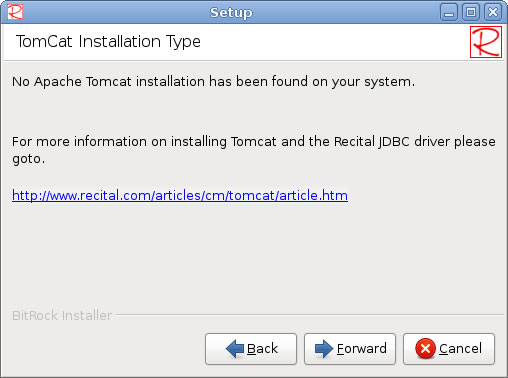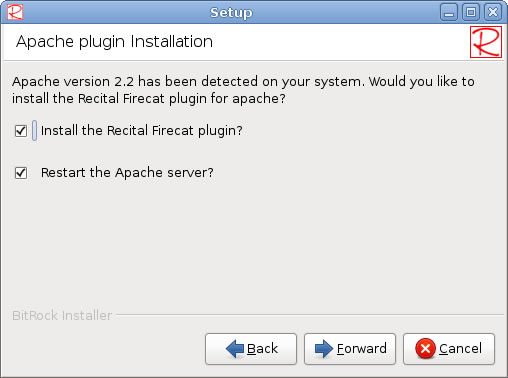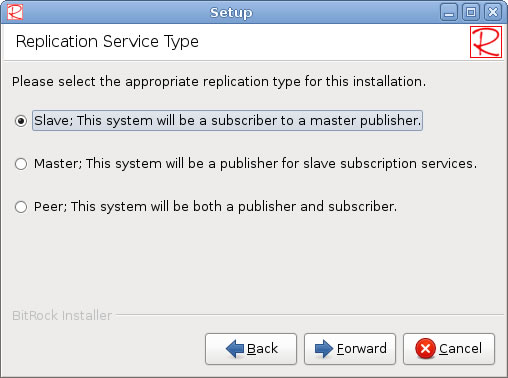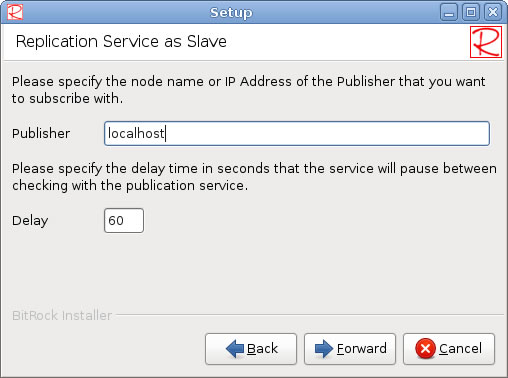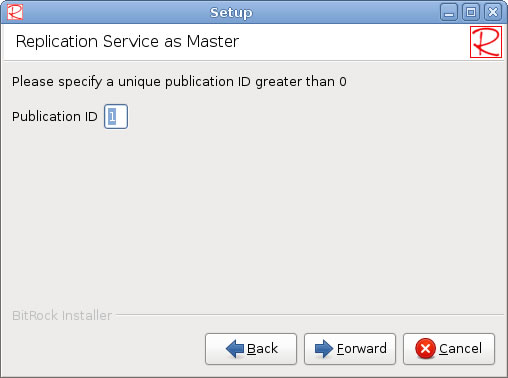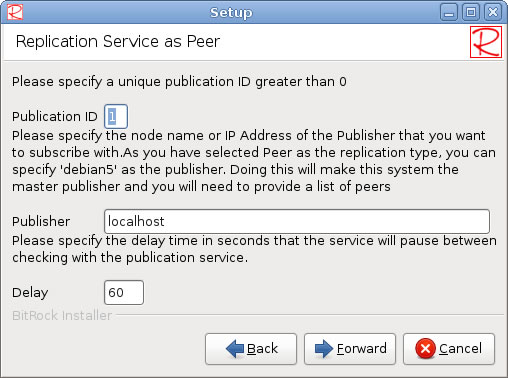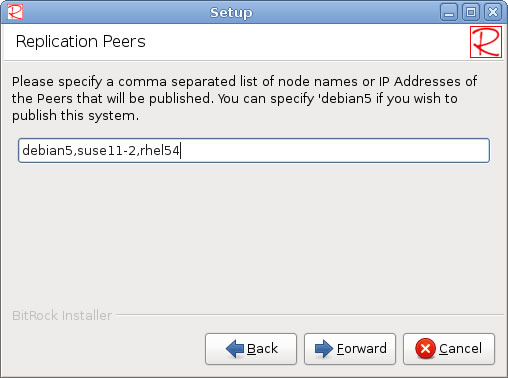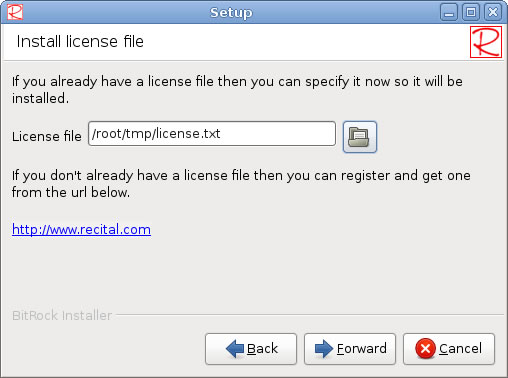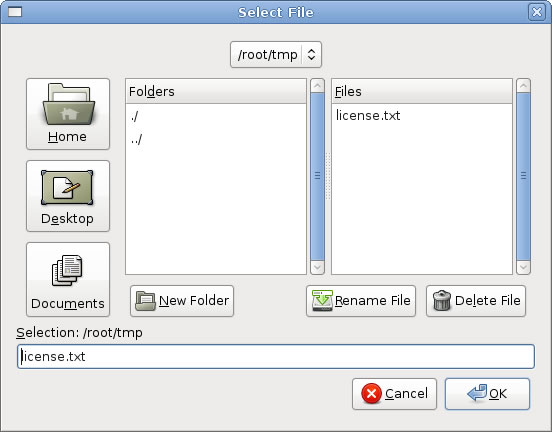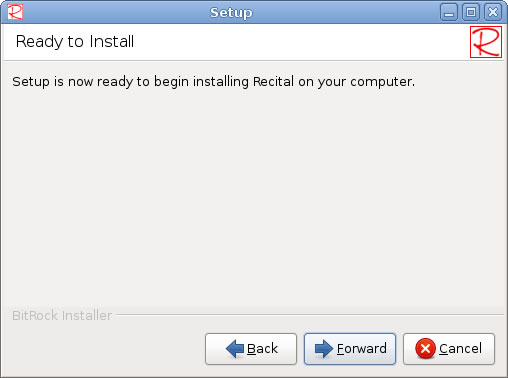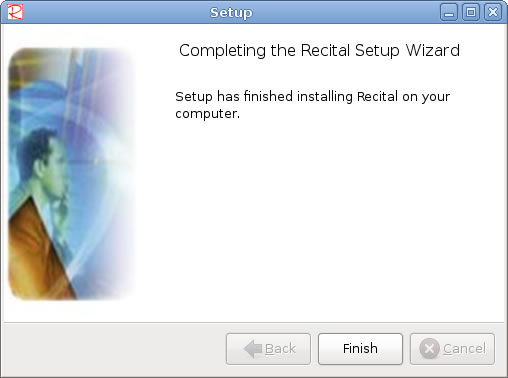Difference between revisions of "Graphical Installation"
Yvonnemilne (Talk | contribs) (→Configuration) |
Yvonnemilne (Talk | contribs) (→Configuration) |
||
| Line 196: | Line 196: | ||
* [[Configuration Files|Recital Configuration]] | * [[Configuration Files|Recital Configuration]] | ||
* [[Configuration Files|Recital Server Configuration]] | * [[Configuration Files|Recital Server Configuration]] | ||
| − | * [[Recital Web Configuration]] | + | * [[:Category:Recital Web Configuration|Recital Web Configuration]] |
* [[Recital Studio Configuration]] | * [[Recital Studio Configuration]] | ||
* [[Recital Replication Configuration]] | * [[Recital Replication Configuration]] | ||
Revision as of 15:58, 9 March 2010
Contents
- 1 Overview
- 2 Text Installation
- 3 Welcome Screen
- 4 License Agreement
- 5 Select Components
- 6 Installation Directory
- 7 Environment
- 8 ODBC Installation Type
- 9 JVM Selection
- 10 TomCat Installation Type
- 11 Apache plugin Installation
- 12 Replication Service Type
- 13 Install License File
- 14 Ready to Install
- 15 Completing the Recital Setup Wizard
- 16 Uninstall
- 17 Configuration
- 18 Getting Started
Overview
Recital 10 products are distributed as a binary executable which contains all the products for that platform and allows any one or more of them to be installed.
Text Installation
The installer will default to a text installation in non-graphical environments. Text installation can also be selected by specifying the --mode text parameter when running the installer on the command line. Please see Text Installation for instructions.
Welcome Screen
Click Forward to continue, Cancel to exit the installation. In the following screens, you will also be able to click Back to return to the previous page.
License Agreement
Please read the license agreement, then select I accept the agreement or I do not accept the agreement and click Forward to continue. If you do not accept the license agreement, the installation will terminate.
Select Components
Select the components you require. As you highlight each component, its description is displayed.
Recital
Recital Server
Recital Web
Recital Client Drivers
Recital Replication
Once you have selected your chosen components, click Forward to continue.
Installation Directory
Please select the directory in which the Recital products should be installed. The default directory is /opt/recital-<version>, where <version> is the version of the software.
To browse your file system, click on the folder button. This will display the Select File dialog, allowing you to choose an existing folder or create a new one.
Click OK to save your selection and return to the previous screen, Cancel to return leaving the installation directory setting unchanged.
This screen also allows you to specify whether a Recital short cut icon should be created for all users or just you (root). Once your selections are complete, click Forward to continue.
Environment
You can choose to allow the installation to link certain important file into /usr/bin so they will be available without having to adjust your PATH setting.
Select Yes or No then click Forward to continue.
ODBC Installation Type
This screen is only displayed if you chose to install the Recital Client Drivers component.
The installer checks to see if you already have an ODBC Driver Manager installed and gives the following defaults:
- Install the Recital ODBC driver for unixODBC Driver Manager. - If you already have the unixODBC Driver Manager installed.
- Install the Recital ODBC driver for iODBC Driver Manager. - If you already have the iODBC Driver Manager installed.
- Don't install the Recital ODBC driver now, do it manually later. - If you do not have a Driver Manager installed.
You can also get the choose to install the unixODBC Driver Manager:
- Install the unixODBC Driver Manager with the Recital ODBC driver.
Once you have made your selection, click Forward to continue.
JVM Selection
This screen is only displayed if you chose to install the Recital Client Drivers component.
The installer checks to see if you have a Java Virtual Machine (JVM) installed and prompts you to select the JVM to be used by the Recital JDBC Driver. Once you have made your selection, click OK to continue and your choice will be displayed.
Click Forward to continue.
TomCat Installation Type
This screen is only displayed if you chose to install the Recital Client Drivers component.
Template:YLM to do needs image with tc installed
Click Forward to continue.
Apache plugin Installation
This screen is only displayed if you chose to install the Recital Web component.
The installer checks to see if you have Apache web server installed and prompts you to install the Recital Web plugin for Apache if so. You can also specify to restart Apache after the installation to enable the plugin. Recital Web can also run as a standalone web server, in which case the plugin is not required. Once you have made your selection, click Forward to continue.
Replication Service Type
This screen is only displayed if you chose to install the Recital Replication component.
- Slave - Select this type if this system will be a slave subscriber in a MSR (Master to Slave Replication) configuration. There can be many slave subscribers but updates will only be performed from data published by the replication service.
- Master - Select this type if this system will be the master publisher in a MSR configuration. There can be only one master publisher and only updates on this system will be published for replication.
- Peer - Select this type if you are setting up a PPR (Peer to Peer Replication) configuration. In a PPR configuration all systems must be set to this type. This system will be able to publish all updates and subscribe to published updates from other systems.
Slave
Publisher
Specify the node name or IP Address of the Publisher that this slave will subscribe to. This should be the system that the Master replication service was installed on.
Delay Specify the delay time in seconds that the service will pause between checking with the publication service.
Master
Publication ID
The publication ID is a unique number that is used to differentiate each system in the replication service. For a master publisher it should be set to a value of 1. This ID should not be changed once the replication service has been started on the system.
Peer
Publication ID
The publication ID is a unique number that is used to differentiate each system in the replication service. The value must be set to a value greater than 1 and must not be the same as any other publication ID. This ID should not be changed once the replication service has been started on the system.
Publisher Specify the node name or IP Address of the Publisher that you want to subscribe with. You can specify the node name or IP Address of the system you are currently installing on. Doing this will make this system the master publisher and you will need to provide a list of peers.
Delay Specify the delay time in seconds that the service will pause between checking with the publication service. If you have specified this system as the publisher, then it will also be used by the publication service.
Replication Peers
This option will be displayed if you have specified that this system will also be the publisher. Please specify a comma-separated list of the node names or IP Addresses of the Peers that will publish. You can specify the system you are installing on if you wish to publish it.
Install License File
If you already have your license file, you can specify the name of the file here. If not, you can install the license after installation.
To browse your file system, click on the folder button. This will display the 'Select File dialog, allowing you to find your license file.
Click OK to save your selection and return to the previous screen, Cancel to return without saving.
Click Forward to continue.
Ready to Install
This is the final point at which you can cancel the installation. If you are happy for the installation to proceed, click Forward to continue.
Completing the Recital Setup Wizard
The following screen will be displayed once the installation completes. Click Finish to exit.
Uninstall
Note: The uninstaller must be run as root.
To uninstall Recital products, run the uninstall script in your chosen installation directory.
Configuration
Please see the Configuration guide for your chosen product(s):
- Recital Configuration
- Recital Server Configuration
- Recital Web Configuration
- Recital Studio Configuration
- Recital Replication Configuration
Getting Started
Please see the Getting Started guide for your chosen product(s):
